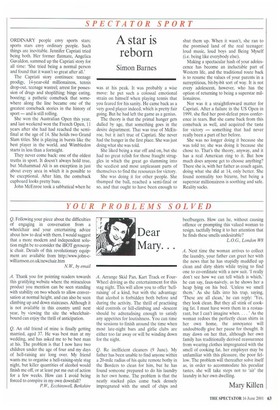A star is reborn
Simon Barnes
ORDINARY people envy sports stars; sports stars envy ordinary people. Such things are inevitable. Jennifer Capriati tried being both. Her former flatmate, Angelica Gavaldon, summed up the Capriati story for all time: 'She tried being a normal person and found that it wasn't so great after all.'
The Capriati story continues: teenage prodigy, 14-year-old millionairess, tennis drop-out, teenage wastrel; arrest for possession of drugs and shoplifting; binge eating, boozing; a pathetic comeback that somewhere along the line became one of the greatest comeback stories in the history of sport — and is still rolling.
She won the Australian Open this year, and last weekend won the French Open, 11 years after she had had reached the semifinal at the age of 14. She holds two Grand Slam titles. She is playing in bursts like the best player in the world, and Wimbledon starts in less than a fortnight.
They never come back: one of the oldest truths in sport. It doesn't always hold true, but Muhammad Ali is an exception in just about every area in which it is possible to be exceptional. After him, the comeback cupboard looks pretty bare.
John McEnroe took a sabbatical when he was at his peak. It was probably a wise move: he put such a colossal emotional strain on himself when playing tennis that you feared for his sanity. He came back as a very good player indeed, which is pretty fair going. But he had left the game as a genius.
The theory is that the primal hunger gets dulled by age, that something goes in the desire department. That was true of McEnroe, but it isn't true of Capriati. She never had the hunger in the first place. She was just doing what she was told.
She liked being a star off and on, but she had no great relish for those fraught struggles in which the great go slumming into the seediest and most unpleasant parts of themselves to find the resources for victory.
She was doing it for other people. She thumped the ball, reached a semi-final or so, and that ought to have been enough to shut them up. When it wasn't, she ran to the promised land of the real teenager: loud music, loud boys and Being Myself (i.e. being like everybody else).
Making a spectacular hash of your adolescence has become an ineluctable part of Western life, and the traditional route back is to resume the values of your parents in a surreptitious, bit-by-bit sort of way. It is not every adolescent, however, who has the option of returning to being a superstar millionairess.
Nor was it a straightforward matter for Capriati. After a failure in the U.S Open in 1999, she fled her post-defeat press conference in tears. But she came back from this comeback as well, and acquired the taste for victory — something that had never really been a part of her before.
She was no longer doing it because she was told to; she was doing it because she chose to. That's the theory, anyway, and it has a real American ring to it. But how much does anyone get to choose anything? There she is, with her father as coach again, doing what she did at 14, only better. She found normality too bizarre, but being a superstar millionairess is soothing and safe. Reality sucks.


































































 Previous page
Previous page